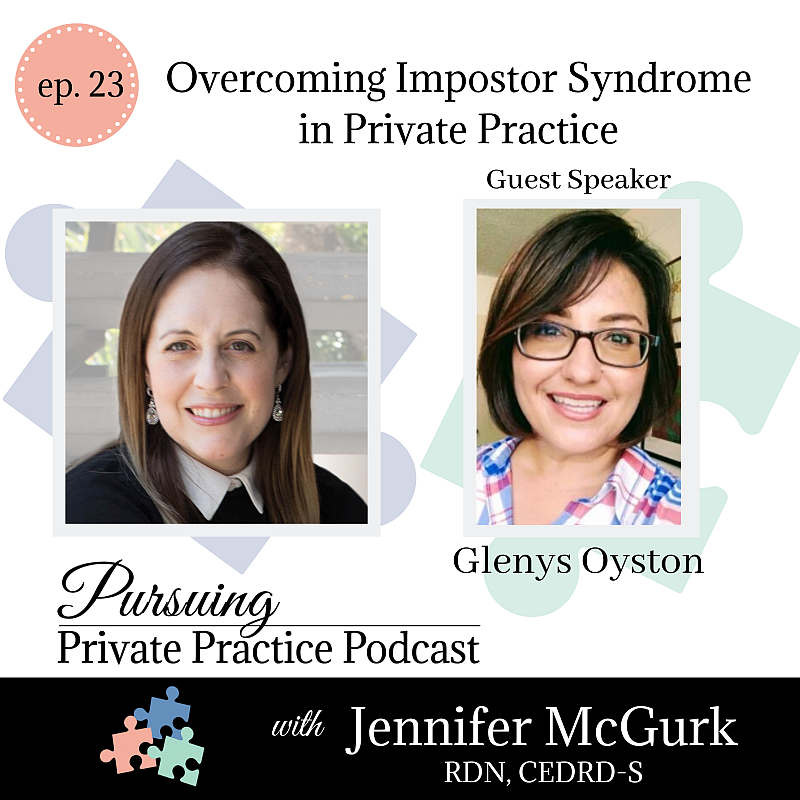Eating
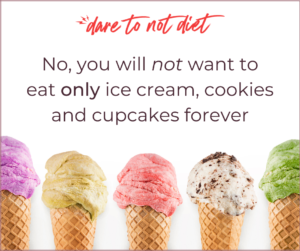
“If I give myself permission to eat anything, I’ll only eat ice cream, cookies and cupcakes forever!”
This is a fear I hear from clients wishing to eat more normally but still unwilling to trust that they contain within them the ability to make wise decisions with food.
When I talk about giving yourself permission to eat all the foods, I really mean all the foods.
Of course, I still want you to focus on giving yourself satisfying meals regularly so that you are getting enough. Enough is important because on diets no one ever eats enough.
So when a client says, “But I’ll only ever eat ice cream for the rest of my life!”…
I say: Okay, let’s try it. Just eat ice cream for all your meals.
Most people think about this and recognize instantly this is not actually appealing. They already see how bored of ice cream they’ve gotten in the few moments of thinking about it.
But sometimes we need to see how this goes. Sometimes someone has to feel it for themselves, in their bodies. We focus on them giving themselves true permission when they eat the food. We make sure they have enough of this food so they won’t run out quickly. I suggest putting the food on a plate, or a bowl, and eat without distractions like the TV or phone (this last one is hardest).
In the many years I have been doing this work, I have never seen anyone eat only sweets for the bulk of their meals the rest of their lives.
Bodies don’t actually like that. Bodies crave a diverse array of foods.
And it doesn’t mean they never eat sweets either. That’s not the goal. The goal is to enjoy the foods they want in quantities that feel good for them.
And they do this.
And you can too.
This is exactly the kind of thing we focus on in my small group coaching program, The Peaceful Eating Jumpstart. Next group starts September 6 and is filling up fast! Come and join us if your eating needs help! Details here.
Start your path to normal eating with my free guide, 5 Strategies to Stop Overeating
Eating
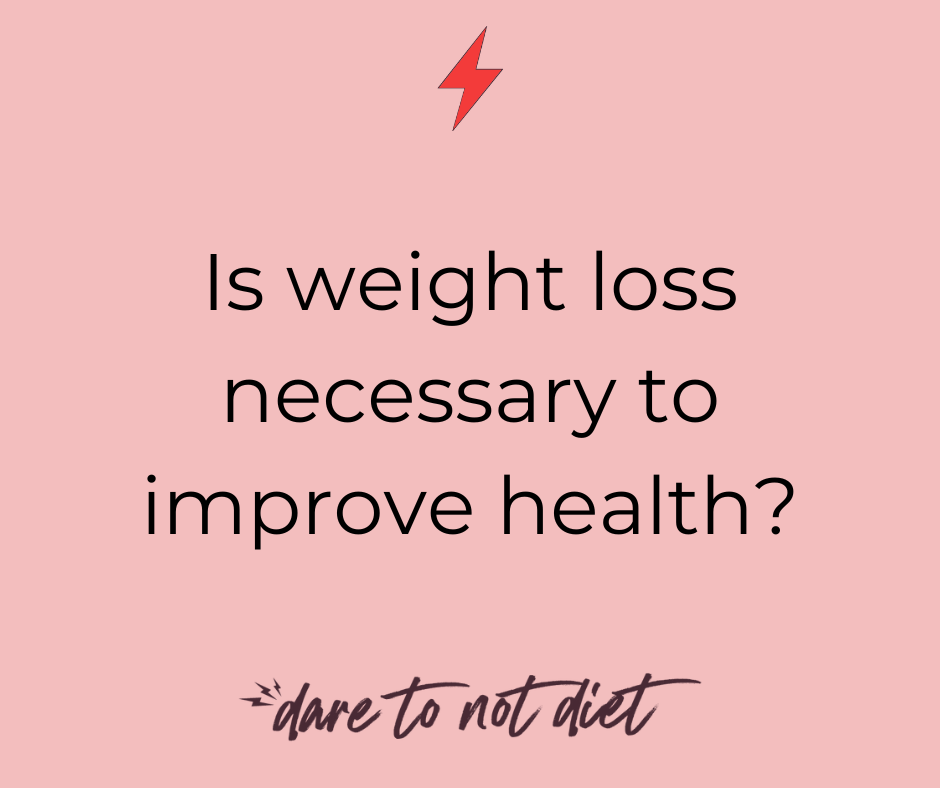
One of the very seductive tactics of the weight loss industry is to convince us that we need to diet to not only “look better!” but also that it is necessary to lose weight to improve your health.
This is not entirely accurate. (especially when we know that diets don’t work very long for most people)
So what works?
In fact, there are many many things you can do to improve your health without having to go on yet another diet. This might look like:
⚡Eating meals regularly throughout the day
⚡Not skipping meals
⚡Aiming for some balance in your plate (protein, fat, carbs)
⚡Exploring ways to include more fruits and vegetables in your diet
⚡Finding exercise that works for YOU and is not focused solely on “burning calories”
⚡Listening for and honoring your hunger and fullness cues
⚡Giving yourself permission to eat as much as you want of all the foods you love
Doesn’t pursuit of health sound SO achievable? That’s because it is!
Except when…diet culture has wreaked havoc on your relationship to food and your body. When you are so convinced you must lose weight to be healthier. When you remember all those negative messages you’ve received about larger bodies.
Yes, then pursuing health becomes more difficult. Then you cannot start with nutrition…instead you must start with healing the eating relationship.
The good part is, developing a healthy, all-foods-fit relationship to food IS healthy. Why? Because this gives your body and brain a chance to hear its natural inclination toward health.
I love seeing the light go off for clients when they suddenly realize they can trust their bodies to make wise choices for them. All it took (and sometimes this takes A LOT of work) was to turn down the critical noise and turn up the trust. And they do get healthier, too!
So no, the drudgery of a weight loss diet isn’t necessary to improve your health! There is a better, more achievable, sustainable and most importantly, enjoyable way.
Are you in need of help with your relationship to food?
Are you struggling to get to this place of gentle nutrition or peace with eating? You’re not alone. My Peaceful Eating Jumpstart Group Coaching Program will be opening for enrollment soon and is designed to bring you relief from emotional eating, binge or overeating or just plain chaotic eating quickly. Stay tuned for more details coming soon (my email list will be notified first – get on my list by downloading my free guide).
Get my free guide, 5 Strategies to Stop Overeating
Eating
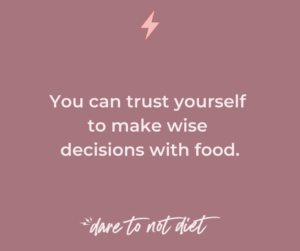
We are born with the innate ability to learn how to trust ourselves with food.
This process starts in infancy.
To learn how to eat well, there had to have been enough food, provided regularly and reliably.
People who were forced into diet culture at a young age had this learning process hijacked. Diet rules which take over the child’s role of deciding how much to eat halt the internal learning-to-eat process.
Food restriction or coercion in childhood feeding takes away the child’s ability to learn to regulate food intake internally. In other words, to build trust in oneself when it comes to eating.
Even if you happily got through childhood with this process intact, an adult lifetime of diets will erode your trust in your ability to make wise decisions with food.
And by wise decisions, I do not mean “only eat healthy foods.”
(and “healthy foods” is a loaded term and means different things to different people, to the point that it has no useful meaning that applies to everyone)
By good decisions, I mean eating enough of the foods that are enjoyable to you.
Enjoying a variety of foods.
Experimenting with new foods on occasion.
Being flexible when it is needed.
Paying attention to hunger and fullness but not so rigidly that you can’t enjoy food when you sometimes aren’t hungry.
Providing meals to yourself reliably.
Making do with the food you have when you don’t have something more exciting.
If right now you aren’t at a place where you make wise decisions with eating, you can get there. Even if this wasn’t learned in childhood, it can be learned in adulthood.
It is a joy to watch my clients learn to trust themselves with food.
You can do it too.
Start your path to normal eating with my free guide, 5 Strategies to Stop Overeating
Eating
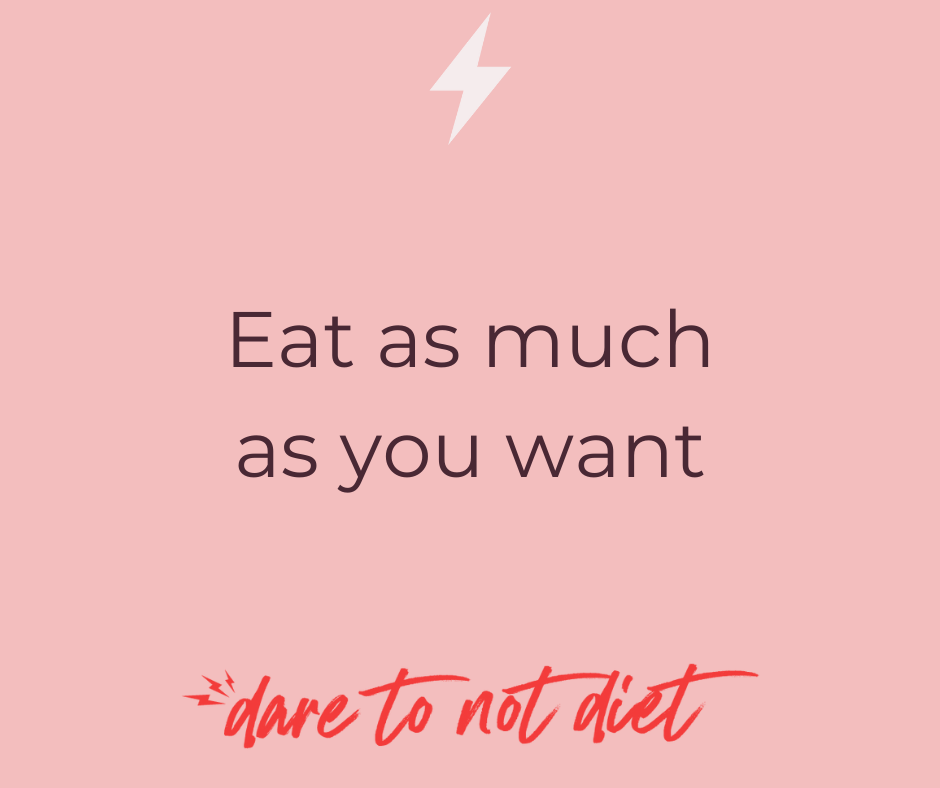
The great thing about learning to eat normally and feel relaxed about eating is that there isn’t just one way to do it.
Intuitive Eating is fantastic and it was one of the books I read early on after quitting dieting for good. It’s one way to learn to eat normally – meaning, listening to your gut (literally) when it comes to knowing when to eat and when to stop, feeling relaxed around food, and feeling confident that you are eating what is right for your body. (It is not a way to lose weight. Losing weight generally does not involve anyone feeling “normal” around food.)
Intuitive eating is one of the ways to learn to eat normally, but it isn’t the only way. There are several other models of non-diet eating, but for now I’m going to talk about my absolute favorite, Ellyn Satter’s Eating Competence model. This was the model that really clicked for me personally and now I use it professionally as well.
Like intuitive eating, this model also trains you to eat according to internal regulation cues, but focuses on the discipline of providing yourself (and your family) rewarding meals at regular times, and the permission to eat as much as you like at each meal. Both IE and EC reject diet mentality and weight manipulation and embrace body diversity, both use internal signals of hunger and fullness to regulate eating. But EC relies more on meal structure to make sure you are eating while IE puts honoring hunger and fullness cues at the forefront of the work. This is useful for my clients who don’t feel hunger signals after years of dieting!
Most importantly, this model hinges on unconditional permission to eat – whatever and as much as you like. Beware of impostors that try to take away that permission, with rules like “eat a vegetable before the rest of your meal,” “fill up on water so you’ll eat less” or “sit and chew your food slowly.” No “tricks,” just permission. If you find yourself making rules about how much to eat that don’t involve how much you actually want to eat, always try to come back to this statement: “I can eat as much as I want.”
If you’re struggling with intuitive eating, you have some options. There isn’t just one way to do this non-diet thing, which is a great thing!
Start your path to normal eating with my free guide, 5 Strategies to Stop Overeating
Eating
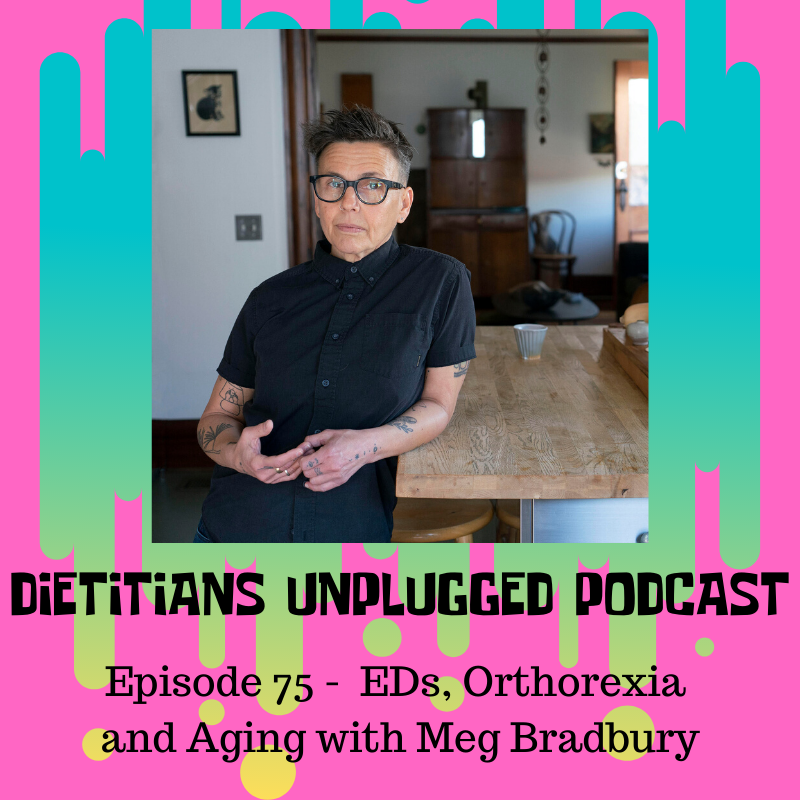
When we think of eating disorders, we so often imagine someone who is younger and struggling. After all, aren’t we supposed to have our lives completely figured out by the age of 35?! (spoiler alert: no)
Meg Bradbury joined us in this Dietitians Unplugged podcast episode to discuss her experience of having an eating disorder and orthorexia as an older person.
Meg Bradbury is a Certified Body Trust Provider®, anti-diet nutritionist, Accessible Yoga® Teacher, and registered Yoga Alliance yoga and meditation teacher. Meg is in private practice working with individuals, groups, and families, advocating for body acceptance, eating disorder/disordered eating/body shame recovery, freedom with food, joyful movement, and stillness/breathwork. She also co-leads the Elderqueer project, an online gathering space for 40+ queers to connect and build community through conversations about aging in body, relationships, emotions, transitions, trust, and cultural relevance. Meg’s practice is fat positive, weight neutral, and LGBTQIA+ affirming.
In this episode, we discussed:
- Meg’s experience of developing an eating disorder
- What is orthorexia, and how it took over her life
- Why orthorexia has become so pervasive in our culture
- The effects of aging on eating disorders
- The tyranny of the anti-aging industrial complex
- Using breath and yoga to connect with the body
Like our podcast?
Make sure to subscribe on Apple podcasts (or wherever you listen to podcasts) and leave us a review. This helps to spread the non-diet love far and wide.
Subscribe and get my free guide:
Why you overeat …and what to do about it
Click here if you just want my newsletter!
Eating
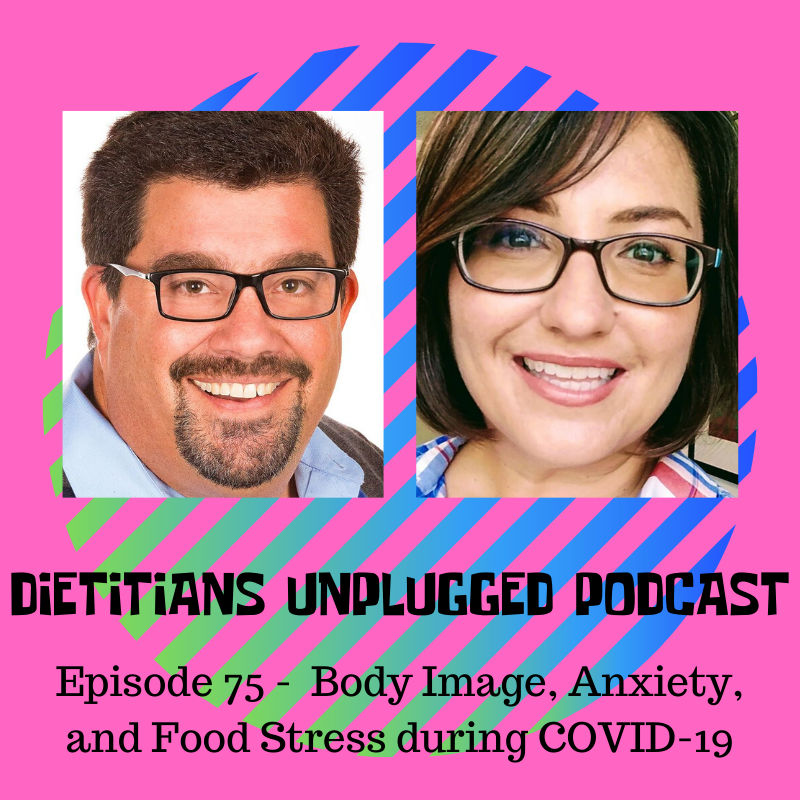
Aaron and I reached out to you from home during the global COVID-19 pandemic in this episode of the Dietitians Unplugged podcast. This is clearly a time of stress and fear for everyone, and it can really bring up a lot of distress around body image, food insecurity and scarcity, and eating in general.
In this episode we discussed:
- Our personal experiences of navigating scarcity at the grocery stores and the emotional roller coaster we’ve both been on
- The hard work and ingenuity our clients and so many others are putting into their healing while stuck at home
- The uptick in body image issues and how many of us use worries about food and body as a way to control anxiety and distract from bigger worries
- Dealing with anxiety and difficult feelings during this time
- How we can use this time to feel better about our bodies
- How some people actually find themselves thriving in the slowed pace
- How diet culture doesn’t go away even in extreme times of uncertainty and worry
Show Notes:
Virtual meal support on Instagram: @covid19eatingsupport
Article: Why You Should Ignore All That Coronavirus-Inspired Productivity Pressure – great advice for dealing with traumatic times
Headspace is offering free support during the global pandemic
Other meditation apps: Insight Timer, Calm
Listen on:
Subscribe and get my free guide:
Why you overeat …and what to do about it
Click here if you just want my newsletter!
Eating
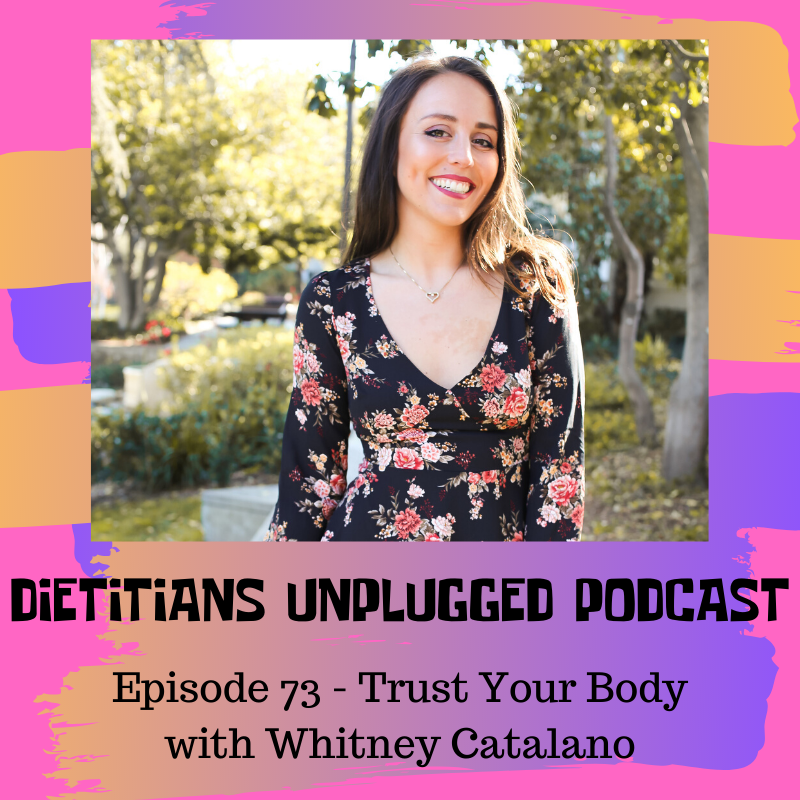
In episode 73 of of the Dietitians Unplugged podcast, Aaron Flores and I were joined by Whitney Catalano, RDN. In this episode, we discussed:
• What it means to learn to trust our bodies
• Tackling emotional and binge eating
• Dealing with the weight-stigma that can show up when visiting medical providers
Show Notes:
Learn more about Whitney Catalano
Listen on:
Subscribe and get my free guide:
Why you overeat …and what to do about it
Click here if you just want my newsletter!
Eating
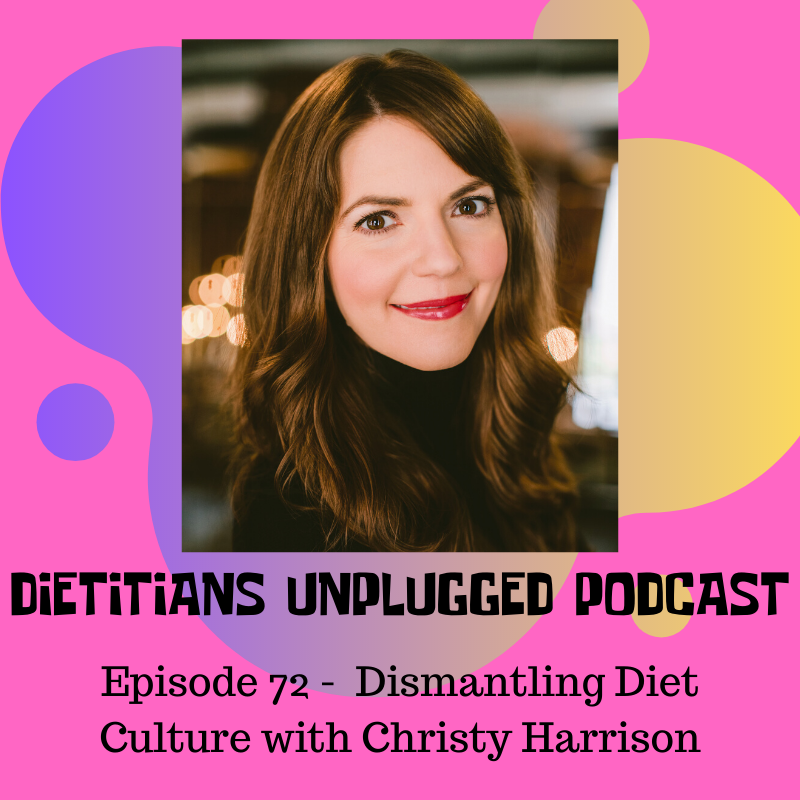
It’s the new decade and, unfortunately, humanity continues to be sold diet culture and weight loss as a remedy for all that ails us.
By now, however, a new theme has emerged. The collective wisdom the many who have ditched dieting has taken on a voice. Many of us are loudly saying, “No more. We know diet culture has harmed us.” We hear it in the growing tidal wave of size acceptance blogs and Instagram accounts and Facebook pages and newspaper and magazine articles that show up in our social media feeds.
This year I had the feeling that the non-diet message had hit a critical tipping point when I sat beside someone on a plane recently who, after seeing the newsletter I had been writing, asked if I was involved in the body positivity movement, and we had a fantastic conversation about how diets were awful and harmful and how learning to accept our sizes and eat normally were more fulfilling and life-affirming than trying to lose weight. Literal strangers are bonding everywhere over their rejection of diet culture!
One of the most prominent voices in this movement in the last few years has been Christy Harrison, MPH, RD, host of the podcast Food Psych and author of the excellent new book Anti-Diet: Reclaim Your Time, Money, Well-Being, and Happiness Through Intuitive Eating. We were excited to have her on the Dietitians Unplugged podcast to kick off the new year and decade and talk about how diet culture has got to go.
I’m such a Christy fan, and have been grateful to know her, starting with guesting on her podcast way back in 2015 (when I was still so green with podcasts). When we met at the BEDA 2016 conference, she was just as warm, friendly, funny and caring as you could imagine. On top of that, she’s a great writer and so knowledgeable, and to me, her book reads like a drama or a thriller, it’s just that damn entertaining (and as I am someone who demands to be entertained by my reading, that’s saying a lot).
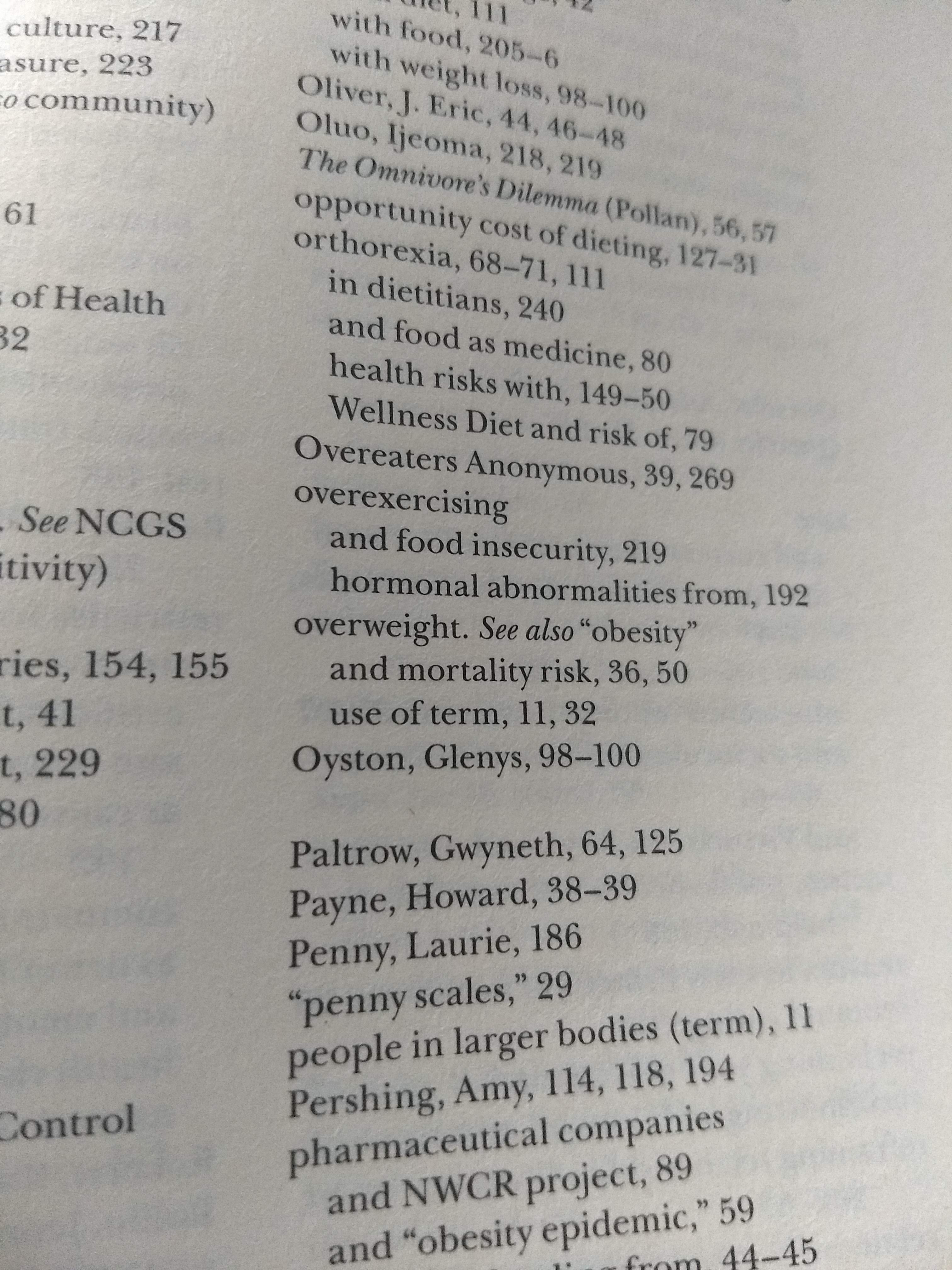
And…I got to be in the book! I discussed my time in the NWCR and experience with dieting, and it was a total thrill to be included alongside actual recognizable people in the index (yay Ijeoma Oluo and Amy Pershing; meh Gwyneth Paltrow). There are so many other wonderful colleagues I’m excited to share pages with in this book – it’s a total honor.
We can make harmful diet culture and fat-phobia things of the past. Read the book, listen to the podcast, spread the word. Live your awesome diet-free life in full view of everyone. It takes WORK to change the culture, and we are no strangers to work.

Show Notes:
Learn more about Christy Harrison
Book: Anti-Diet: Reclaim Your Time, Money, Well-Being, and Happiness Through Intuitive Eating
Get on the list for announcements: Self-Care for Diabetes
Listen on:
Get more Glenys:
I was honored to be a guest on Jennifer McGurk’s Pursuing Private Practice Podcast where I talked about overcoming imposter syndrome in building your business. Check it out!
Subscribe and get my free guide:
Why you overeat …and what to do about it
Click here if you just want my newsletter!
Eating
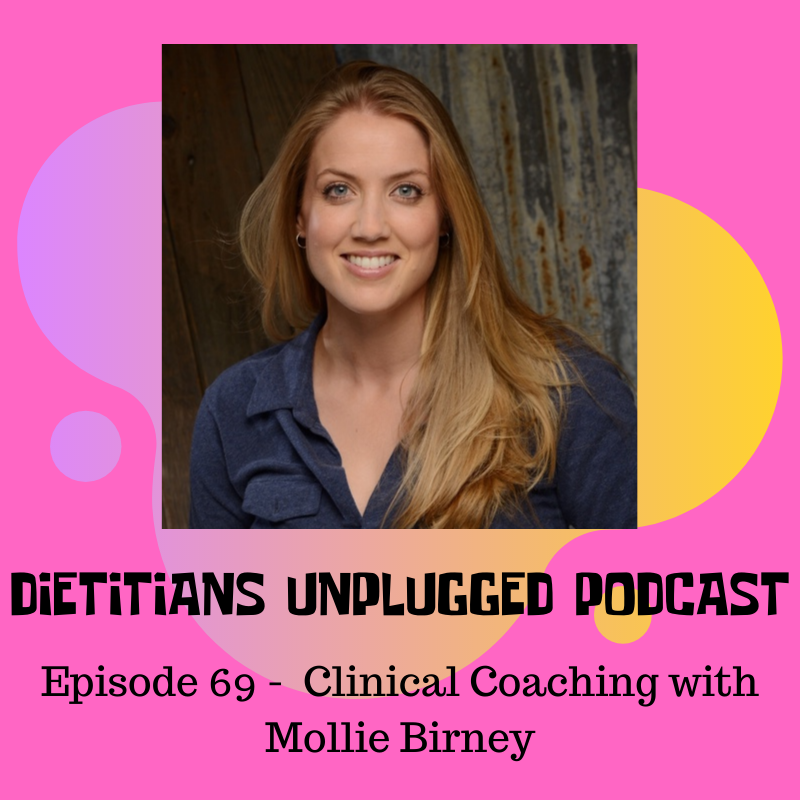
We welcomed Mollie Birney, Clinical Coach and Recovery Consultant with a specialization in the area of Eating Disorders and compulsive behaviors around food to the Dietitians Unplugged podcast.
Mollie holds a Masters in Clinical Psychology with a concentration in Addiction and Eating Disorders from Antioch University in Los Angeles, and has been in the field of mental health and addiction recovery since 2009. She has worked as a therapist with groups and individuals at all levels of care including inpatient, residential and outpatient treatment programs, as an interventionist for families in crisis, and as a private coach for high-performing individuals grappling with transitions and behavioral change. Her coaching style is deeply influenced by the principles of narrative therapy, and aims to arm her clients with strategies for challenging ingrained, and often trauma-informed belief systems. She has been in recovery from her own ass-kicking bulimia since 2007.

Show Notes:
Find out more about Mollie at her website: https://molliebirney.com/
Listen on:
Subscribe and get my free guide:
Why you overeat …and what to do about it
Click here if you just want my newsletter!
